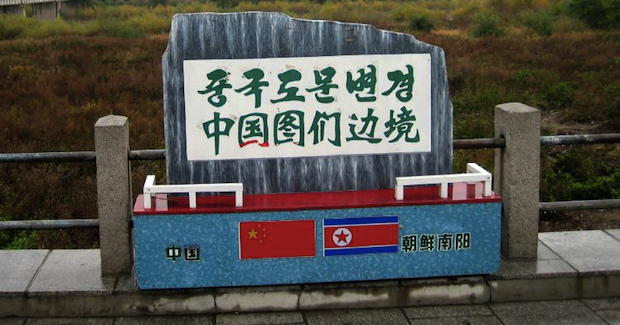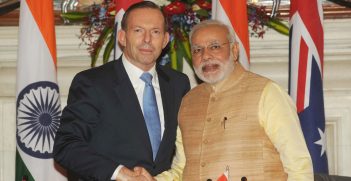China's View of North Korea

While China seeks stability on its periphery, North Korea continues to upset regional security with domestic problems and a nuclear weapons program. Given the significance of domestic Chinese public opinion, Beijing finds itself in an uncomfortable situation, trying to manage the domestic view of its troublesome alliance with Pyongyang.
On 9 September 2016, the Democratic People’s Republic of Korea (DPRK) conducted its fifth nuclear test at the Punggye-ri Nuclear Test Site. It caused an unexpected earthquake in the north east of the DPRK, and triggered a vibrant discussion among China’s general public concerning Kim’s regime and the Sino-DPRK relationship.
As a consequence of the historical alliance and the contemporary behaviour of the North Korean authorities, the Chinese express a generally ambivalent attitude toward the DPRK. According to the index of the largest Chinese search engine, the topics most discussed and searched by Chinese citizens related to the country pertain to the DPRK’s domestic status quo, tourism, the Korean War, and Sino-DPRK relations.
Sino-DPRK history
First, it is worth discussing China’s official views of the DPRK and their alliance. In the decade following the Korean War, China continually provided a large amount of reconstruction aid to the DPRK. However, when China and the Soviet Union began to diverge significantly, Sino-DPRK relations became unstable as the DPRK authorities attempted to reach a balance between the two most powerful forces in the communist world. They did this in an effort to acquire more aid for self-development and economic recovery from both China and the Soviet Union.
At the beginning of the 1960s, because of China’s substantial disagreements with USSR leader Nikita Khrushchev, DPRK leader Kim Il-sung decided to mend the country’s relationship with China. Consequently, the PRC and the DPRK signed the Mutual Aid and Cooperation Friendship Treaty, thereby making the two countries formal allies.
However, as a consequence of China’s Cultural Revolution and Khrushchev’s downfall, the DPRK distanced itself from China once again. Beginning in 1970, Kim’s regime adopted an ‘equidistance’ diplomatic policy towards China and the Soviet Union. It was not until the collapse of the Soviet Union that Pyongyang became dependent on Beijing offering considerable and necessary aid to the DPRK.
Teeth and lips
Presently, Sino-DPRK relations are quite complex. On the one hand, China does not want the DPRK to have nuclear arms, fostering the proliferation of nuclear weapons in East Asia. Kim’s refusal to abandon its nuclear development plan and non-acceptance of nuclear suspension agreements has strained the Sino-DPRK alliance.
Conversely, China still wants to maintain this ‘Teeth and Lips’ alliance, as the ruling parties in both countries share the same political ideology and revolutionary friendship—and both see the US and its allies as a potential security threats. Further, it is not in China’s best interest to see the collapse of DPRK, as it would result in South Korea ruling the whole peninsula, and the possible presence of US troops at China’s border.
Chinese interest
As the DPRK is shrouded in secrecy and intrigue, the Chinese public are incredibly interested in their neighbouring country. There are very few photos, videotapes and articles concerning life in the DPRK, making it difficult for the Chinese to get a broad view, which has resulted in the subject becoming one of the most frequently searched topics on the internet.
Further, many Chinese travel to the DPRK to pique their curiosity. Some, especially those alive between the 1960s and the 1980s, believe that life in today’s DPRK might be reminiscent of that in China at an earlier time—a nostalgic tour. As relations between the two countries are close, it is easier and cost efficient for Chinese travel agencies to organise trips to the DPRK. Generally, Chinese visitors return from their DPRK trips holding unenthusiastic views the country.
Reflections on the Korean War
As well as interest in the DPRK’s status quo, internet searches by the Chinese show a strong interest in and diverging perspectives on the Korean War. On the one hand, older generations of Chinese, especially those whose ancestors participated in the war, hold a strong belief that the conflict was about fighting against ‘imperial’ America, and that it successfully protected both the people of the DPRK and the people of China. This faction of the Chinese public uphold values and ideas of anti-imperialism, independence and self-determination, which can be considered a post-colonial identity.
Accordingly, they urge China’s young generation to show respect to the sacrifice of these soldiers and cherish this hard-won peace together with the revolutionary friendship between the people of China and the people of the DPRK.
Other Chinese also hold a positive view of the Korean War, arguing that the war was aimed at protecting the strategic space of the newly established China and opposing America’s growing sphere of influence near Chinese borders. Thus, these Chinese defend the outcome of the Korean War, which is the existence of the DPRK and an alliance between China and the DPRK.
Contrary to the positive opinions, some Chinese insist that the decision to join the Korean War was unwise, arguing that it led to the loss of opportunity to reunite Taiwan with mainland China. These people also assert that the Soviet Union dragged China into this war. Consequently, their perceptions of the DPRK are quite different from people with a positive view.
DPRK troubles and public opinion
Aside from these historical factors, the contemporary domestic troubles of the DPRK are negatively influencing the Chinese public’s perception of their neighbouring state. Firstly, the execution of Jang Sung-taek marked a major political conflict within the regime. Jang was the husband of Kim Jong-un’s aunt, who used to be the second-most powerful figure in the DPRK. Jang was perceived to have close ties with China; thus, Jang’s execution might have dissatisfied some Chinese.
The second factor is the dangerous and blusterous behaviours of the DPRK authorities. For instance, their nuclear tests and missile tests, as well as their violations of agreements and the failure of the Chinese-led six-party talks, have lead many people in China to consider the DPRK as untrustworthy and dangerous.
Third, China’s general public also shows concern over the DPRK’s poverty, its failure to adhere to basic human rights and the many other sufferings that the people of the DPRK face. As a result of this awful image, some Chinese hold the view that China should either restrain the DPRK’s authority robustly or completely abandon this ally.
Lastly, the Chinese public opinion of the DPRK alters depending on the responses of the United States and South Korea to DPRK affairs. Some Chinese might show sympathy if the US were to impose heavy sanctions on Pyongyang. However, some assertive actions by the US and South Korea such as the upcoming deployment of THAAD (Terminal High Altitude Area Defence System) will trigger fear among China’s general public concerning their national security. In response to these actions, the Chinese public might reconsider the notion that the DPRK is a buffer state between China and the US-led alliance system.
Therefore, both the Chinese public and official views on the DPRK are ambivalent. It is also unclear as to whether China’s public perceptions on the DPRK exert influence on the Chinese government’s policies towards the country. Regardless, the government of China should encourage patience in regards to the DPRK and try to constrain its authority, while hoping for gradual reform.
Leyang Wang is currently studying a bachelor of international relations and international security at the Australian National University and is a former intern of the AIIA.
This article is published under a Creative Commons Licence and may be republished with attribution.





